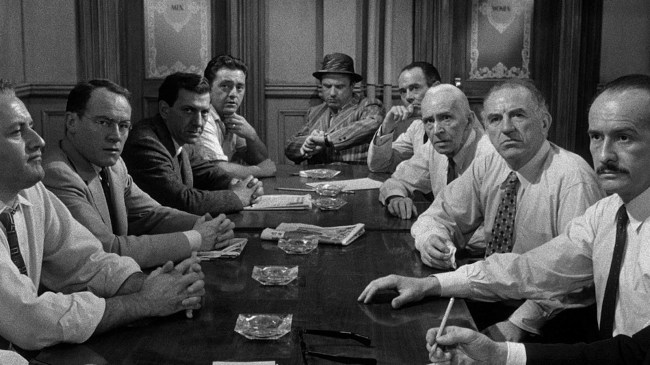United Artists
12 Angry Men, the 1957 legal drama directed by legendary filmmaker Sidney Lumet, is widely considered to be one of the best American movies ever made.
The film, which largely takes place in a New York City jury deliberation room, sees the 12 men discuss whether to vote guilty or not guilty in the case of a teenager who’s been charged with murder.
In the lead role of Juror 8 is the famed Henry Fonda, who starred in the film alongside Lee J. Cobb, Ed Begley, E. G. Marshall, and Jack Warden.
In the year 2007, it was added to the United States National Film Registry by the Library of Congress. The point is: 12 Angry Men is an iconic, beloved, foundational American film.
And still, despite its reverence and popularity, Amazon Prime Video thought it’d be a good idea to create an AI-generated poster for the thumbnail of the film on its streaming app. Making matters worse is the fact that the AI-created monstrosity doesn’t even feature 12 angry men, but as one viral tweet put it, “19 terrifying men.”
“Amazon using AI-generated images to advertise classic movies now. I honestly no longer know what we’re doing as a society anymore. We’re destroying culture and history and any sense of a shared reality to save a couple of dollars on a poster? This has to end, or be made to end,” said another viral tweet that was critical of Prime Video’s decision to clearly use AI.
AI has recently become not just a massive, potentially world-altering societal issue but a specific problem for Hollywood, as evidenced by last year’s actors’ and writers’ strikes that were largely motivated by being protected from the technology.
Netflix, for example, just made a movie — called Atlas, starring Jennifer Lopez — about a human learning to accept (and from what I’ve heard, eventually fall in love with?!) artificial intelligence that had a trailer so shoddy it was widely mocked for looking like it was made by AI.
And yet, despite all of this, Atlas has performed well for Netflix (in terms of the only metric they care about: viewership), which spells even more AI-related trouble for Hollywood creative and, therefore, us: fans of movies and television.

